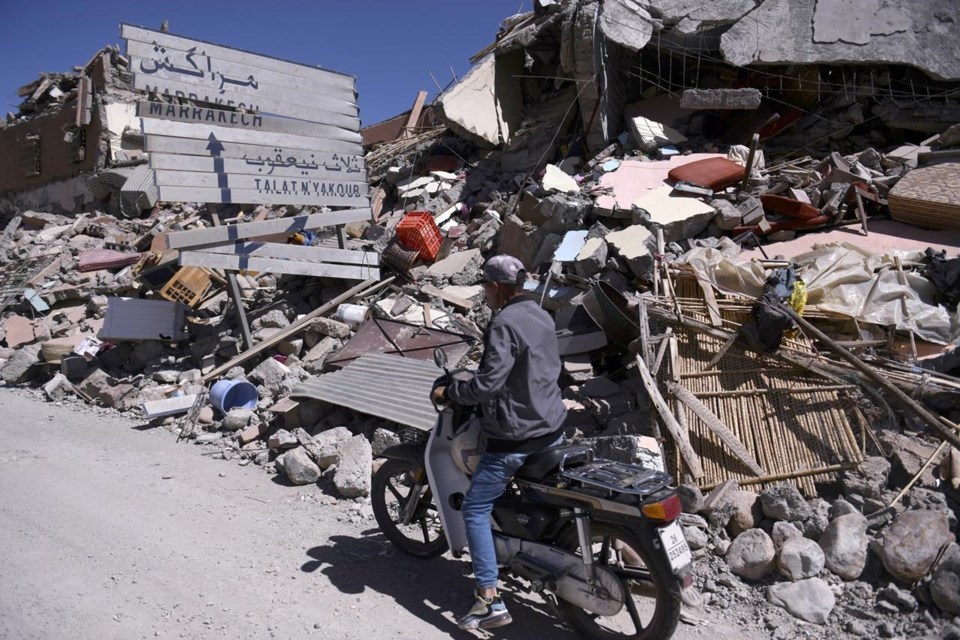MONTREAL — Hassaan Sheikh says that as his team distributes blankets and mattresses in Moroccan villages, they are told about bodies being discovered under the rubble of homes flattened by last week's earthquake.
Sheikh, a Vancouver-based aid worker with Islamic Relief Canada, says the "complete destruction" from the 6.8-magnitude earthquake makes clear how much help the country will need to recover.
Federal and provincial governments, charities and Moroccan Canadians are mobilizing to help the North African country, which has reported more than 2,900 deaths and several thousand injuries after the earthquake struck south of the city of Marrakech last Friday.
On Wednesday, federal International Development Minister Ahmed Hussen said the government would match donations — up to $3 million — made to the Canadian Red Cross's earthquake relief fund over the next two weeks.
The money will help the International Red Cross and Red Crescent Movement distribute life-saving items, such as food, water, cash and vouchers, as well as deliver sanitation and health services, according to Global Affairs Canada. Another $2 million in federal assistance will go toward immediate needs.
Sheikh said the most vulnerable villages are built directly on the side of mountains, with homes of mud and brick. In one village he visited on his second day in Morocco, 90 per cent of the population had died.
"It was just levelled, almost," he said. "You know when you see a landslide, that's kind of what it looks like."
Sheikh said that in the short term, Moroccans need food, tents, and hygiene products, while in the longer term they will need their homes, roads and infrastructure rebuilt. Despite the material needs, he said many of the people he met were also looking for emotional support.
"When we meet them, even before asking for food or tents or whatever, there's just this outpouring of just emotions, and they don't know what to do, what's next."
As workers race to reach remote villages, the international community — including Canada — is jumping to Morocco's aid.
The Quebec government has pledged $1.5 million for organizations working in Morocco, while several major charities have launched funding drives. Islamic Relief Canada collected about $40,000 in the first hour of fundraising, says communications and government relations manager Miranda Gallo.
In Montreal, home to a large Moroccan community, citizens, mosques and businesses have launched grassroots efforts to help. Ould Atigh, who owns the North African restaurant La Khaima, said he organized a couscous fundraiser for Wednesday night as a way to feel less helpless.
"It will make me feel a little like I've done something to help because sometimes we're far away and we can't do anything," said Atigh, who lost friends in the earthquake.
Mohammed Jorio, a Moroccan Montrealer, said he had been talking with his sister on WhatsApp last Friday when she told him the curtains and table were shaking. Even after verifying that she and their parents were safe in the capital, Rabat, Jorio said he didn't sleep all night, knowing that the death toll would be devastating.
Soon after, he started SOS Maroc, a WhatsApp group in which fellow Quebec Moroccans can brainstorm ways to help their homeland; the group has since grown to 450 members. In an interview late Tuesday, he said messages were pouring in, including from mosques in Ottawa wanting to help.
"We've lived more of our lives here than in our country, but our hearts are still connected to the motherland," he said of Quebec's Moroccan community, estimated at more than 80,000.
"And when you see 3,000 dead, 5,500 injured and several thousand without a place to live, we have to do something."
After tossing ideas back and forth, he said the group has settled on collecting monetary donations, with three aid organizations as beneficiaries. The group is collecting money at a local community centre, he said, and has designated people to accept e-transfers or cash.
Jorio, who says he's just a "simple citizen" who isn't a member of any organization, said he's been overwhelmed by the response from friends and co-workers, who have shown him support or asked where they could donate.
"That's the beauty of Montreal, the beauty of Quebec, the beauty of Canada," he said. "People come together to help."
Sheikh said his group is working with other organizations to assess needs on the ground, such as tents, medication and food. But he said the organization is also starting to think about the longer-term rebuilding.
"We don't want to just hand them food and everything that they need immediately, and then walk away," he said.
This report by The Canadian Press was first published Sept. 13, 2023.
Morgan Lowrie, The Canadian Press



